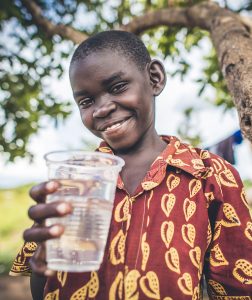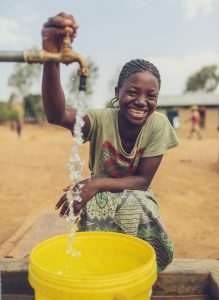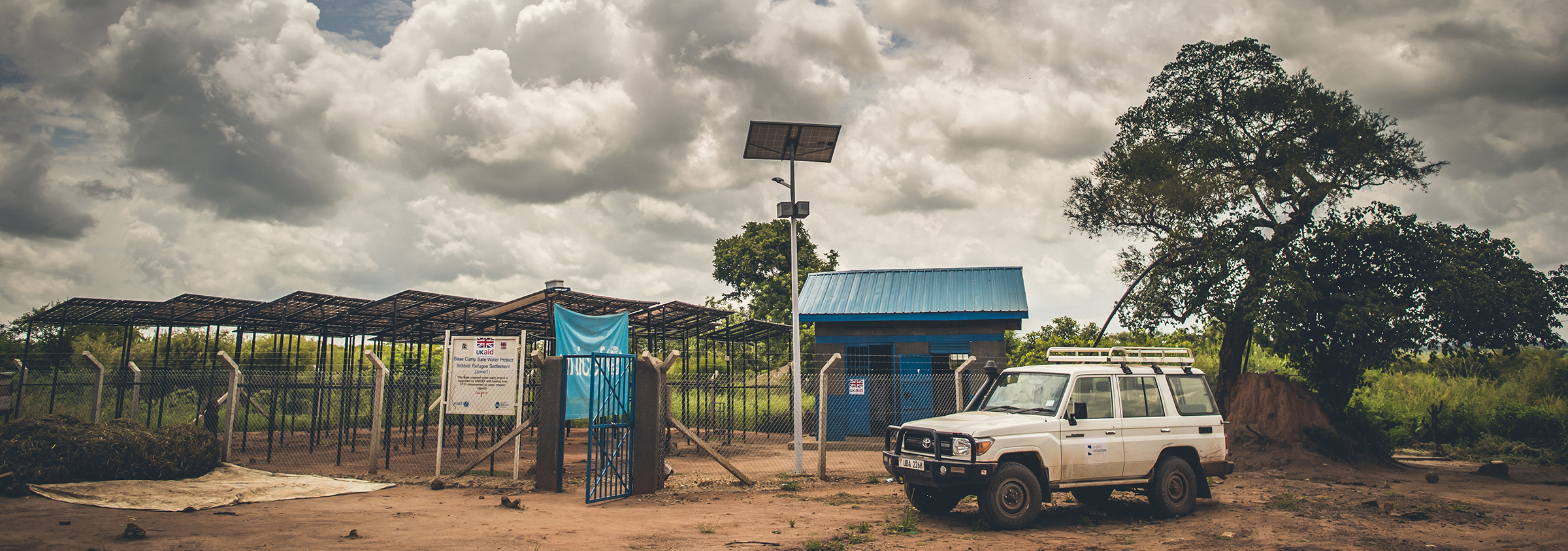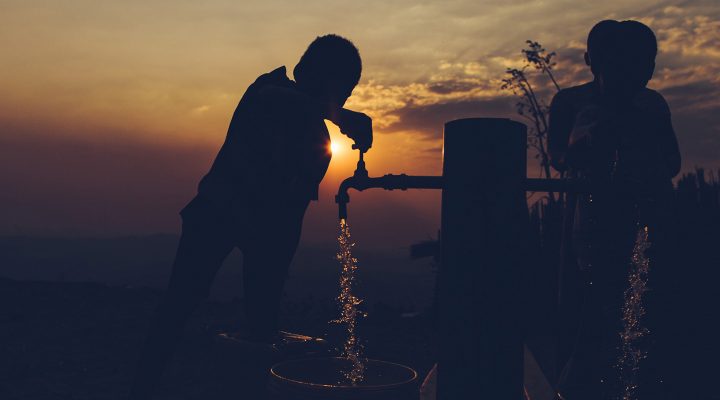Within just a few days of the recent outbreak of war in Sudan an essential resource, water, became a scarce commodity.
The scarcity continues to this day in parts of the North African country, making life a living hell for traumatized residents.
But the war-induced water scarcity isn’t a new phenomenon in Sudan. Long before the violence erupted in mid-April, the country had grappled with water scarcity.

Dada Angelo and family, Bidi Bidi Refugee Settlement, Uganda, October 19, 2017 (Photo: Water Mission)
In an article published by the Water Project, a nongovernmental organization, Alexandra Barton points out that “Sudan faces ecological crises like water scarcity and desertification. Rural Sudanese are displaced often by changing landscapes and a lack of agricultural production. The demand for water increases, but its availability to the country’s inhabitants continually remains low. Access to water is needed.”
Scarcity of water impacts people in different ways, according to a 2021 UNICEF report. The study states that “more than 12 million people” in Sudan “do not have access to safe water, which compromises their health and makes them vulnerable to disease outbreaks, like cholera.”
That was before the current war broke out.
Sudan is not the only country affected by water scarcity. Other African countries including Kenya, Somalia, Niger Republic, Nigeria and South Africa face water shortages.
On a broader scale, this is a global challenge.
A recent Council on Foreign Relations report titled “Water Stress: A Global Problem That’s Getting Worse” said more than 2 billion people worldwide “lack access to safe drinking water and nearly double that number — more than half the world’s population — are without adequate sanitation services.”
Of this number, the report adds, “The Middle East and North Africa is the worst off in terms of physical water stress, according to most experts.”
This region, known as MENA, “receives less rainfall than other regions and its countries tend to have fast-growing, densely populated urban centers that require more water.”

Water Mission Community Managed Project, Namaela, Malwawi, 2015 (Photo: Water Mission)
Yet what is true of the whole is not true of all individual places. Wealthier locales still meet their water needs.
“For example, the United Arab Emirates imports nearly all of its food, alleviating the need to use water for agriculture,” the report explains. “The UAE and other wealthy MENA countries also rely heavily on the desalination of abundant ocean water, albeit this process is an expensive, energy-intensive one.”
Given the financial, infrastructure and environmental challenges many African countries face, water scarcity in many areas — rural or urban — creates serious discomfort, stress and unsanitary conditions. These vary from one community or town to the other, affecting the quality of life. Aside from the inconvenience to humans, scarcity of water in Africa also impacts the agricultural sector, which leads to food scarcity.
This is worsened by ever-changing climatic conditions, which Africa is increasingly prone to as evidenced by drought, shrinking rivers and lakes and unreliable rainfall in the region.
To address this situation, irrigated agriculture has been helpful and boreholes — some of which were constructed with the help of public-spirited individuals and organizations — have served as lifeline sources of water to many communities across Africa.
But there’s a new way to access water from those wells that is making a splash in Africa and beyond.
Water Mission, a Christian engineering nonprofit, says its solar-powered water systems are the best option.
“Solar-powered water systems offer safe water and hope for communities across the world and, more often than not, are a favored approach for Water Mission,” its publicity explains. “In addition to being beneficial for the environment (especially when compared to systems powered by generators), solar-powered pumps are sustainable for the communities that operate them.”
Water Mission claims to have installed more than 1,400 solar-power systems and argues that “when compared with alternative power sources — including hand pumps, an electrical grid connection or generator power — solar power is the best overall choice in many situations.”
Most of the advantages of solar-power water pumping, it says, fall into four categories: Serving more people; treating, storing and distributing water; providing high levels of service in remote areas; and minimizing operational and maintenance costs.
Water Mission says its mission is to “honor God by developing, implementing and sharing best-in-class, safe water solutions that transform as many lives as possible, as quickly as possible.”

Solar-powered water station in Uganda, 2017. (Photo: Water Mission)
In sum, the organization says: “Solar-powered pumping is one way we can serve our global neighbors while being good stewards of God’s creation.”
By whatever means, creative solutions are needed, according to Thandile Chinyavanhu, climate and energy campaigner for Greenpeace Africa, because government inaction has compounded the water problem.

Thandile Chinyavanhu
“Many African countries have arid to semi-arid climates, which contributes to water scarcity,” she explained. “On the other hand, the fossil fuel industry is extremely water-hungry, and the coal industry in particular guzzles thousands of liters of water per second in the process of electricity generation through burning coal. This, combined with poor maintenance of infrastructure and corruption in government paints a grim picture of water access on the continent.”
Water shortage, climate change and food access all are interconnected, she added. “Climate change is widely acknowledged as a threat multiplier, and the scientific consensus is that climate change will cause extreme weather events such as droughts and floods to become less predictable and more intense. Drought can cause economic loss, bring crop failures, put food security at risk, and can lead to a shortage of safe, clean drinking water.”
Over the past two months, a series of events marking World Water Day, Earth Day and Environmental Day were held, with another upcoming one, World Day to Combat Desertification and Drought, coming in June. The United Nations and other relief organizations are highlighting this threat in conferences and educational efforts.
Chinyavanhu believes the importance of water, environmental and climate events cannot be overemphasized.
“Events such as these are important opportunities to communicate and raise awareness about issues such as climate change,” she said. “What the current socioeconomic system has forced most people to forget is that we share collective power to create change when we take action together.”
Anthony Akaeze is a Nigerian-born freelance journalist who lives in Houston. He covers Africa for BNG.


